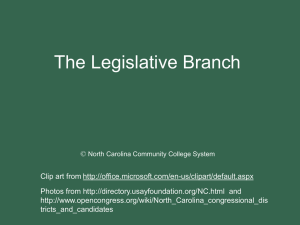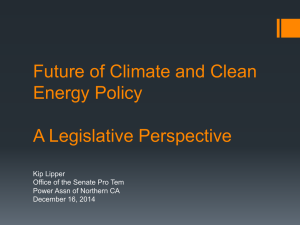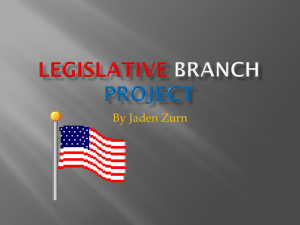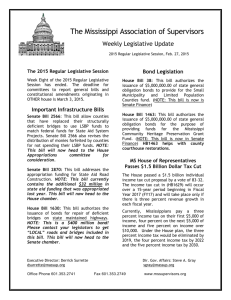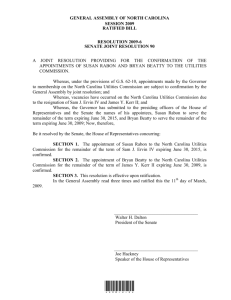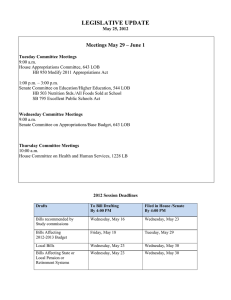Executive Advisory Council Roundtable Item
advertisement
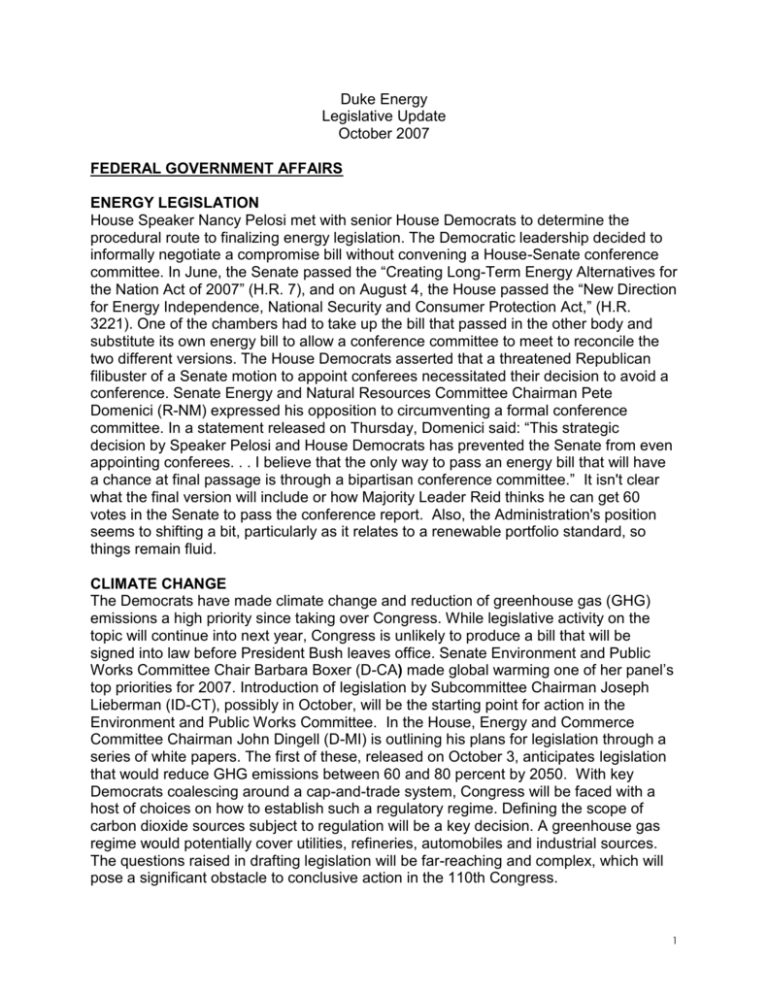
Duke Energy Legislative Update October 2007 FEDERAL GOVERNMENT AFFAIRS ENERGY LEGISLATION House Speaker Nancy Pelosi met with senior House Democrats to determine the procedural route to finalizing energy legislation. The Democratic leadership decided to informally negotiate a compromise bill without convening a House-Senate conference committee. In June, the Senate passed the “Creating Long-Term Energy Alternatives for the Nation Act of 2007” (H.R. 7), and on August 4, the House passed the “New Direction for Energy Independence, National Security and Consumer Protection Act,” (H.R. 3221). One of the chambers had to take up the bill that passed in the other body and substitute its own energy bill to allow a conference committee to meet to reconcile the two different versions. The House Democrats asserted that a threatened Republican filibuster of a Senate motion to appoint conferees necessitated their decision to avoid a conference. Senate Energy and Natural Resources Committee Chairman Pete Domenici (R-NM) expressed his opposition to circumventing a formal conference committee. In a statement released on Thursday, Domenici said: “This strategic decision by Speaker Pelosi and House Democrats has prevented the Senate from even appointing conferees. . . I believe that the only way to pass an energy bill that will have a chance at final passage is through a bipartisan conference committee.” It isn't clear what the final version will include or how Majority Leader Reid thinks he can get 60 votes in the Senate to pass the conference report. Also, the Administration's position seems to shifting a bit, particularly as it relates to a renewable portfolio standard, so things remain fluid. CLIMATE CHANGE The Democrats have made climate change and reduction of greenhouse gas (GHG) emissions a high priority since taking over Congress. While legislative activity on the topic will continue into next year, Congress is unlikely to produce a bill that will be signed into law before President Bush leaves office. Senate Environment and Public Works Committee Chair Barbara Boxer (D-CA) made global warming one of her panel’s top priorities for 2007. Introduction of legislation by Subcommittee Chairman Joseph Lieberman (ID-CT), possibly in October, will be the starting point for action in the Environment and Public Works Committee. In the House, Energy and Commerce Committee Chairman John Dingell (D-MI) is outlining his plans for legislation through a series of white papers. The first of these, released on October 3, anticipates legislation that would reduce GHG emissions between 60 and 80 percent by 2050. With key Democrats coalescing around a cap-and-trade system, Congress will be faced with a host of choices on how to establish such a regulatory regime. Defining the scope of carbon dioxide sources subject to regulation will be a key decision. A greenhouse gas regime would potentially cover utilities, refineries, automobiles and industrial sources. The questions raised in drafting legislation will be far-reaching and complex, which will pose a significant obstacle to conclusive action in the 110th Congress. 1 Status and Outlook of Legislative Efforts Overview: � There will be a concerted to begin the legislative process in the House and Senate, with action in committees possible before the end of 2007. � A consensus among key Democrats has emerged for aggressive, economy-wide, mandatory reductions in GHG emissions. � Legislation is unlikely to be enacted in the 110th Congress. However, proposals debated in 2007 and 2008 will likely serves as a baseline in 2009, especially if Democrats control both the White House and Congress after the 2008 elections. STATE GOVERNMENT AFFAIRS City of Cincinnati All eyes are now on the November elections, when all of Council will be up. Given ViceMayor Jim Tarbell's resignation and the assumption of his spot on Council by newlyminted Charterite Roxanne Qualls, all nine members of the present council will be standing for re-election. Former Council members and candidates Charlie Winburn and Minette Cooper appear to be the most likely non-incumbent winners -- which would then mean ouster of one or two present members. Mayor Mark Mallory does not stand for re-election until 2009. All nine Cincinnati City Council members are elected at-large (there are no districts or wards within the City). On Wednesday, October 17, the Cincinnati Chamber of Commerce and its various downtown business members are conducting a Council Candidates' fair on Fountain Square. An announcement flyer is attached, and we certainly hope many of our downtown employees can put in an appearance. This replaces the candidates' fair done in past years in the lobby of the company's 4th and Main building in Cincinnati, and hopefully will provide an opportunity for even more people who work downtown to meet the candidates individually. Indiana Indiana’s state legislature will re-convene in January 2008, but much work has been/is being done by your Government Affairs team to prepare for what is expected to be a fairly active “short session” of the General Assembly. The primary focus of the upcoming legislative session will be on a major overhaul of the state’s property tax system – an issue that could have a profound impact on our company. We are also working on our own legislative agenda that may include a bill containing provisions relative to Renewable Portfolio Standards, Energy Efficiency and Cost Recovery for the installation of certain air pollution equipment, e.g., carbon, fine particulates, etc. 2 Kentucky Members are now back home in their districts after the completion of the second special (or "extraordinary") session, when they passed legislation creating a variety of tax incentives intended to attract coal-to-natural gas manufacturers to the Commonwealth. Now, all eyes are on the impending state-wide constitutional officer elections, headlined by the Governor's race. With less than a month to go to the election, Democrat Steve Beshear holds double-digit leads over incumbent Republican Governor Ernie Fletcher in each of Kentucky's major media markets -- including Republican stronghold Northern Kentucky. Also on the November ballot are races for state Attorney General, Secretary of State, State Auditor, State Treasurer, and Secretary of Agriculture. When the General Assembly convenes in regular session in January, one major item of business will be passage of a new biennial budget. The regulated utility industry in the Commonwealth (investor-owned and rural electric cooperative utilities) fully expects that the legislature will deal with a bill having to do with accelerated cost recovery of new, state-of-the-art coal-burning electric generation plants. There may also be companion legislation that creates more incentive to invest in energy efficiency. Then, following the session in April, members will begin planning for the November 2008 election when all of the House seats will be up, and half the Senate. Ohio Electric Industry Restructuring in Ohio is arguably the most important issue facing the company at this time. It will reset the framework for how the industry owns and operates generation for the foreseeable future. In addition to affecting the financial health of utilities and our ability to invest and grow, it is also seen as the linchpin for economic development in the state. Gov. Strickland recently requested a bill be introduced in the Senate, specifically 127-SB221 (Schuler, by request) STATEWIDE ENERGY POLICY, which: 1) determines the structure for long-term rate plans called Electricity Security Plans; 2) defines a market option for utilities; 3) sets an Advanced Energy Portfolio Standard w/ an RPS component; 4) encourages energy efficiency and new technology investments; and, 5) defines authorities and responsibilities for other related issues with regards to the Air Quality Development Authority and PUCO. DE-Ohio interests in SB221 are aligned with the other investor-owned utilities and all have voiced the same or similar concerns over several provisions of the bill. As such, together with the other companies DE-Ohio will propose changes that balance stakeholder needs while maintaining customer choice. The bill is expected to move through the Senate by the end of October. The process in the House is less clear as of now, and will depend heavily on the content of the bill when it reaches that chamber. 3 North Carolina The North Carolina legislature is not currently in session, but the work has not slowed. Overwhelming support for Cliffside’s Unit 6 was voiced by local residents and elected officials including local legislators at the plant’s air permit hearing on Tuesday, Sept. 18. We hope to have the final permit in late November or early December. Efforts continue to gather letters and comments to the USEPA Administrator on the agency’s proposed change to the National Ambient Air Quality Standard for ozone. The North Carolina Chamber has sent an alert to members as a result of our coordinated effort and written letters. Also responding has been the NC Manufacturers and Chemical Industries Council as well as elected officials and economic development leaders. The last meeting of the NC Climate Action Plan Advisory Group (CAPAG) is scheduled for Oct. 16. The CAPAG has developed approximately 50 recommendations to reduce greenhouse gas emissions in NC. This meeting will finalize the NC CAPAG report. The final report will be forwarded to the Legislative Study Commission on Climate Change. On the economic development front, legislators and NC Gov. Mike Easley avoided a showdown over the governor's veto of a bill designed to help Goodyear Tire & Rubber Co. modernize its Fayetteville plant. Instead, they reached a deal in a special legislative session in early September on an expanded package of incentives aimed at helping Goodyear and rival Bridgestone Corp., which is already upgrading its tire plant in Wilson. South Carolina The South Carolina legislature is not currently in session. The South Carolina Governor’s Climate Change Committee continues to meet on a regular basis. Jim Rogers is a member of the committee and Mark Hollis of our Carolinas Regulatory and Government Affairs group is providing technical support and manages our attendance at the Energy Supply Technical Working Group as part of the Committee’s activities. The Committee’s recommendations are due in 2008. Efforts also continue in South Carolina to gather letters and comments to the USEPA Administrator on the agency’s proposed change to the National Ambient Air Quality Standard for ozone. The SC Chambers has written a letter demonstrating their concerns with the change. Also responding with concerns have been the SC Manufacturers Association, elected officials and economic development leaders from across the state. The SC Department of Revenue has reported to Governor Sanford that actual revenue collections in 2007 have failed to meet projections. The revenue growth rate, which started the year at 8.6 percent, is now down to 3 to 4 percent. Sanford has directed Cabinet agency directors to prepare for “serious belt tightening” in crafting budget recommendations for 2008. Finally, Energy Solutions (Chem-Nuclear) has abandoned its plans to pursue new legislation in 2008 in South Carolina to extend the life of the Barnwell facility to nonAtlantic Compact states beyond July 2008. Similar legislation in 2007 died in a House committee by a 16-0 vote. Therefore, only low-level waste generators in the Atlantic Compact states of South Carolina, Connecticut and New Jersey will be allowed to dispose of low-level nuclear waste at Barnwell after July 2008. 4
